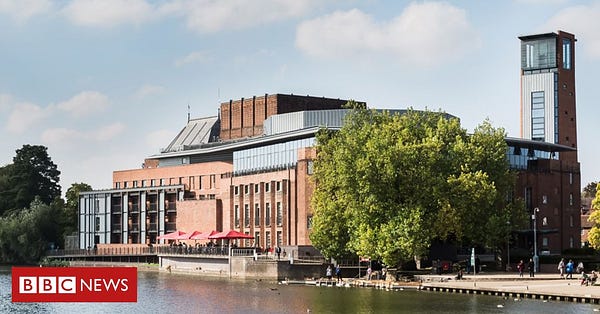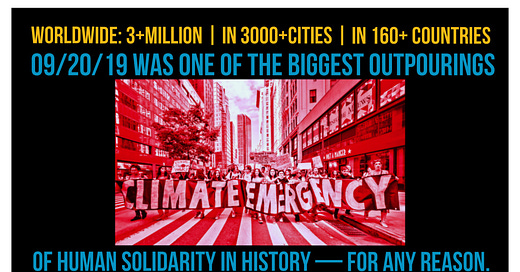Now, the Good Climate Crisis News
$11 Trillion Later, the Fossil Free Movement Rolls On | ISSUE 24, Oct. 5, 2019
We’re kidding. There is no “good” climate news—if we look only at how unnervingly fast the climate crisis is unfolding. If we see only the head-in-the-sand response of politicians whose rule depends on the mighty fossil fuel industrial complex. As one commentator noted on the podcast “My Climate Journey”:
“Climate action is against the law in most places.”
(Thanks to Crowdsourcing Sustainability for the link).
But, wait. A huge global climate strike just happened. The marches on Sept. 20, 2019, have been called among the largest in human history. Climate correspondent Eric Holthaus summed up the strike in some memorable numbers. More than 3 million people marched. In more than 3,000 cities. In more than 160 countries.

Please steal this climate meme.
1 | DE-FUNDING ‘CLIMATE CHAOS’
Good climate news also includes the growing climate change dis-investment campaign. If you’re not following global climate campaigner Bill McKibben’s Twitter feed, do so ASAP. He keeps a tick-tock tally of investment funds and institutions that have begun to yank money from the fossil fuel industry.
In September, McKibben’s 350.org announced that the Fossil Free divestment campaign passed $11 trillion in portfolios and endowments. For perspective’s sake, that's larger than the GDP of every nation on Earth except the U.S. and China. The effort includes more than 1,100 institutions:
Assets committed to divestment have leapt from $52 billion in 2014 to more than $11 trillion today—a stunning increase of 22,000 percent. Institutions committed to divestment include sovereign wealth funds, banks, global asset managers and insurance companies, cities, pension funds, health care organizations, universities, faith groups and foundations.
The campaign is part of a larger strategy, the report explains. Banks like France’s Credit Agricole are cutting off financing to fossil fuel projects. One bank industry watchdog described this in a memorable phrase as “coal realism”:
“Too many banks are still unwilling to decouple themselves from the industry which is the number one biggest threat to the climate globally and which is now on economic life support.”~Greg Aitken, coal campaigner at BankTrack
Meanwhile, some big insurance firms now balk at underwriting coal projects. Lack of insured capital then creates a chokehold on new CO2-spewing projects that perpetuate what 350.org dubs “climate chaos.” As its report notes: “Without bank loans, insurance and investments — the fossil fuel industry hits a wall.”
For a layman’s explainer on tackling climate change at the dollar level, see McKibben’s New Yorker article, “Money Is the Oxygen on Which the Fire of Global Warming Burns.” A sample insight:
I suspect that the key to disrupting the flow of carbon into the atmosphere may lie in disrupting the flow of money to coal and oil and gas … It’s possible to imagine [the banking, asset management and insurance] industries, given that the world is now in existential danger, quickly jettisoning their fossil-fuel business. It’s not easy to imagine—capitalism is not noted for surrendering sources of revenue.
Then again, he acidly notes, “the Arctic ice sheet is not noted for melting.”

2 | ‘AN OBLIGATION TO ACT’
Are you a recently woke climate marcher? An alarmed Joe-or-Jane? A spooked under-30-something? A worried-for-your-grandkids-Grandma-or-Grandpa? Looking for something local to work on?
Pick an institution with which you have a connection. Your church or temple? Your bank? Your college? Your pension fund? (See 350.org’s report for more ideas.) Push that $11 trillion divestment number higher. Here are some inspirational case studies.


THE ROYAL SHAKESPEARE COMPANY: “To thine own self be true…”
WHO: The esteemed Royal Shakespeare Company will end its partnership with BP at the end of 2019, following criticism of its links to the international oil giant.
QUOTE/UNQUOTE: BP has subsidized the Stratford-on-Avon-based theatre company's £5 ticket price for 16 to 25-year-olds since 2011, a £7.5 million subsidy. Last week, students threatened to boycott the company if it didn’t sever links with BP. "Young people are now saying clearly to us that the BP sponsorship is putting a barrier between them and their wish to engage with the RSC," a company statement read. BP responded that they are sad. A statement said the company was "disappointed and dismayed" its partnership had been brought to a "premature" end.
IF YOU’RE JUST TUNING IN: Earlier this year, Sir Mark Rylance, a long-standing critic of the sponsorship agreement, resigned from his post as an RSC associate artist. The Oscar-winning actor said he did not "wish to be associated with BP any more than I would with an arms dealer [or] tobacco salesman.”
THE UNIVERSITY OF YORK: “Some things change at least…”
WHO: One of the United Kingdom’s leading universities, The University of York, announced early this month it has divested from all fossil fuels.
QUOTE/UNQUOTE: “We face a global climate emergency,” said Vice-Chancellor Charlie Jeffrey. “We have brilliant expertise, including among our students, who are often passionate about tackling that emergency, and we have an obligation to act.”
IF YOU’RE JUST TUNING IN: If you feel like Don Quixote, tilting madly at climate windmills, note this. Environmental policy journalist Gareth Simkins wrote the University of York’s first environmental audit way back in 2001. “Divestment from fossil fuels was one of my recommendations—though I knew it was never going to fly at the time,” Simkins noted on Twitter. “Some things change, at least.”

3 | ‘ExxonKnew’
How much money did you earn from July to August 2018? We’ll wait as you run the numbers… Was it $5,000? $10,000? Less? More? Here’s how much ExxonMobil made in those 90 days: $6.2 billion.
Let’s see all those zeros printed out: $6,200,000,000. Or, if you prefer, $68,888,888—a day. Such numbers explain something else. They explain how Exxon’s own scientists knew as early as 1981 about the coming onslaught of climate change—then buried the science in misdirection and misinformation. That’s why there’s a popular Twitter hashtag: #ExxonKnew. Or Google the phrase for many more hits.

4 | ‘You Have To Trust Me’
It’s not as if fossil fuel firms don’t see the handwriting on the wall. They’re not—to quote an Irishman hoisting a Guinness—'‘eed-jits.” They devote whole retreats to the pressing matter of the future of fossil fuel-ing. One such event was described in a Financial Times article with the colorful headline: Royal Dutch Shell Searches for a Purpose Beyond Oil: Anglo-Dutch company faces dilemma as world shuns fossil fuels
Shell honchos were asked to ponder: ‘What should one of Earth’s largest oil and gas companies look like in several decades?’ (Should we humans survive “climate chaos,” that is.) Ben van Beurden, the 61-year-old head of Shell, described the discussion this way: “What do we want to be? What do we want to be known for?” The “single biggest” regret for the Shell boss would be abandoning its oil and gas business prematurely, he says in the article.
That, he says starkly, is something Shell “could not live with”.
That comment earned the Twitter equivalent of a Molotov cocktail from Bill McKibben. He printed the quote, then noted simply: “Clinically amoral.”
In Changing Climate Times tweets, we’ve suggested some of the most influential climate activists might be found in living rooms of fossil fuel CEOs after work. The FT story describes just such an encounter.
When Van Beurden’s daughter was nine or 10, she returned from school in tears after somebody told her oil and gas companies were destroying the world and only Greenpeace could save the planet.
“So why don’t we give [all of our] money to Greenpeace, papa?” she said. Too young to engage in debate over carbon taxes and the responsibility of all governments, consumers and corporate polluters, the Shell boss replied: “You have to trust me.”
Winning the trust of all of Shell’s competing stakeholders, the article concludes, “will be much harder.”

5 | ‘A Variety of Fronts’
If you’re old as dirt, this divestment stuff may sound vaguely familiar. That’s because it is. The campaign recalls the global effort to pressure South Africa to abandon apartheid. That campaign helped lead the South African Government to start negotiations resulting in apartheid’s dismantling.
For a good perspective on how global campaigns on multiple fronts can move mountains, see this recollection by human rights advocate Cecelie Counts, a founder of the Southern Africa Support Project. In words that offer a birds-eye perspective to climate activism, she writes:
It's easy to see parallels between the current divestment campaigns over climate change and guns, and the earlier campaign to divest from companies doing business with apartheid South Africa. But as important as divestment was in ending apartheid, that campaign came after and during a very broad and well-engaged struggle on a variety of fronts.
Desmond Tutu, a key figure in the apartheid campaign, had a striking thing to say recently about the threat to the human race and more than a million other species on Earth posed by the climate crisis.
Climate change, said the good bishop “is the apartheid of our times.”


PS | You Promised Cartoons
I did, back in Issue 1 in November 2018. This cartoon is awfully apropos for Issue 24:

By Dan Piraro | Bizzaro.com
If this issue was forwarded to you, subscribe for free to the newsletter & podcast at: changingclimatetimes.substack.com. Subscribe to the podcast on iTunes and wherever you listen to podcasts. | Follow us on Twitter at @TimesClimate | Send feedback and suggestions to: douglasjohnmartin AT icloud.com.
And remember:
Change the World. Not the big one. The one in which you live. And love. Be well. | CCT Curator, Concierge and Host Douglas John Imbrogno




